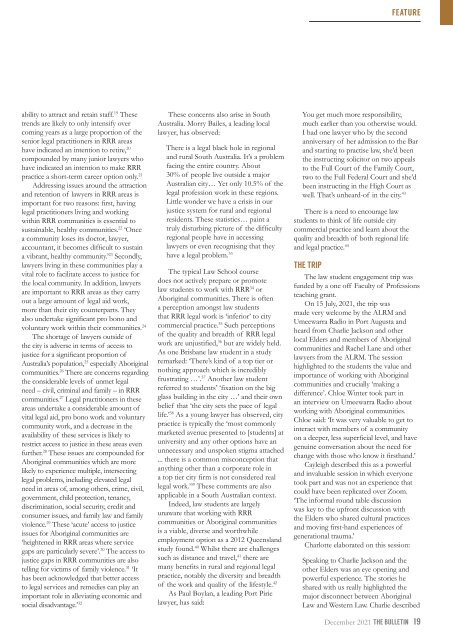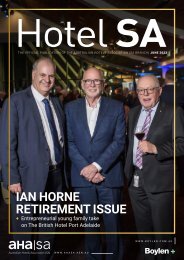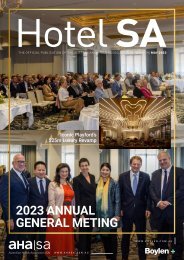LSB December 2021 HR
Create successful ePaper yourself
Turn your PDF publications into a flip-book with our unique Google optimized e-Paper software.
FEATURE<br />
ability to attract and retain staff. 19 These<br />
trends are likely to only intensify over<br />
coming years as a large proportion of the<br />
senior legal practitioners in RRR areas<br />
have indicated an intention to retire, 20<br />
compounded by many junior lawyers who<br />
have indicated an intention to make RRR<br />
practice a short-term career option only. 21<br />
Addressing issues around the attraction<br />
and retention of lawyers in RRR areas is<br />
important for two reasons: first, having<br />
legal practitioners living and working<br />
within RRR communities is essential to<br />
sustainable, healthy communities. 22 ‘Once<br />
a community loses its doctor, lawyer,<br />
accountant, it becomes difficult to sustain<br />
a vibrant, healthy community.’ 23 Secondly,<br />
lawyers living in these communities play a<br />
vital role to facilitate access to justice for<br />
the local community. In addition, lawyers<br />
are important to RRR areas as they carry<br />
out a large amount of legal aid work,<br />
more than their city counterparts. They<br />
also undertake significant pro bono and<br />
voluntary work within their communities. 24<br />
The shortage of lawyers outside of<br />
the city is adverse in terms of access to<br />
justice for a significant proportion of<br />
Australia’s population, 25 especially Aboriginal<br />
communities. 26 There are concerns regarding<br />
the considerable levels of unmet legal<br />
need – civil, criminal and family – in RRR<br />
communities. 27 Legal practitioners in these<br />
areas undertake a considerable amount of<br />
vital legal aid, pro bono work and voluntary<br />
community work, and a decrease in the<br />
availability of these services is likely to<br />
restrict access to justice in these areas even<br />
further. 28 These issues are compounded for<br />
Aboriginal communities which are more<br />
likely to experience multiple, intersecting<br />
legal problems, including elevated legal<br />
need in areas of, among others, crime, civil,<br />
government, child protection, tenancy,<br />
discrimination, social security, credit and<br />
consumer issues, and family law and family<br />
violence. 29 These ‘acute’ access to justice<br />
issues for Aboriginal communities are<br />
‘heightened in RRR areas where service<br />
gaps are particularly severe’. 30 The access to<br />
justice gaps in RRR communities are also<br />
telling for victims of family violence. 31 ‘It<br />
has been acknowledged that better access<br />
to legal services and remedies can play an<br />
important role in alleviating economic and<br />
social disadvantage.’ 32<br />
These concerns also arise in South<br />
Australia. Morry Bailes, a leading local<br />
lawyer, has observed:<br />
There is a legal black hole in regional<br />
and rural South Australia. It’s a problem<br />
facing the entire country. About<br />
30% of people live outside a major<br />
Australian city… Yet only 10.5% of the<br />
legal profession work in these regions.<br />
Little wonder we have a crisis in our<br />
justice system for rural and regional<br />
residents. These statistics… paint a<br />
truly disturbing picture of the difficulty<br />
regional people have in accessing<br />
lawyers or even recognising that they<br />
have a legal problem. 33<br />
The typical Law School course<br />
does not actively prepare or promote<br />
law students to work with RRR 34 or<br />
Aboriginal communities. There is often<br />
a perception amongst law students<br />
that RRR legal work is ‘inferior’ to city<br />
commercial practice. 35 Such perceptions<br />
of the quality and breadth of RRR legal<br />
work are unjustified, 36 but are widely held.<br />
As one Brisbane law student in a study<br />
remarked: ‘There’s kind of a top tier or<br />
nothing approach which is incredibly<br />
frustrating …’. 37 Another law student<br />
referred to students’ ‘fixation on the big<br />
glass building in the city …’ and their own<br />
belief that ‘the city sets the pace of legal<br />
life.’ 38 As a young lawyer has observed, city<br />
practice is typically the ‘most commonly<br />
marketed avenue presented to [students] at<br />
university and any other options have an<br />
unnecessary and unspoken stigma attached<br />
... there is a common misconception that<br />
anything other than a corporate role in<br />
a top tier city firm is not considered real<br />
legal work.’ 39 These comments are also<br />
applicable in a South Australian context.<br />
Indeed, law students are largely<br />
unaware that working with RRR<br />
communities or Aboriginal communities<br />
is a viable, diverse and worthwhile<br />
employment option as a 2012 Queensland<br />
study found. 40 Whilst there are challenges<br />
such as distance and travel, 41 there are<br />
many benefits in rural and regional legal<br />
practice, notably the diversity and breadth<br />
of the work and quality of the lifestyle. 42<br />
As Paul Boylan, a leading Port Pirie<br />
lawyer, has said:<br />
You get much more responsibility,<br />
much earlier than you otherwise would.<br />
I had one lawyer who by the second<br />
anniversary of her admission to the Bar<br />
and starting to practise law, she’d been<br />
the instructing solicitor on two appeals<br />
to the Full Court of the Family Court,<br />
two to the Full Federal Court and she’d<br />
been instructing in the High Court as<br />
well. That’s unheard-of in the city. 43<br />
There is a need to encourage law<br />
students to think of life outside city<br />
commercial practice and learn about the<br />
quality and breadth of both regional life<br />
and legal practice. 44<br />
THE TRIP<br />
The law student engagement trip was<br />
funded by a one off Faculty of Professions<br />
teaching grant.<br />
On 15 July, <strong>2021</strong>, the trip was<br />
made very welcome by the ALRM and<br />
Umeewarra Radio in Port Augusta and<br />
heard from Charlie Jackson and other<br />
local Elders and members of Aboriginal<br />
communities and Rachel Lane and other<br />
lawyers from the ALRM. The session<br />
highlighted to the students the value and<br />
importance of working with Aboriginal<br />
communities and crucially ‘making a<br />
difference’. Chloe Winter took part in<br />
an interview on Umeewarra Radio about<br />
working with Aboriginal communities.<br />
Chloe said: ‘It was very valuable to get to<br />
interact with members of a community<br />
on a deeper, less superficial level, and have<br />
genuine conversation about the need for<br />
change with those who know it firsthand.’<br />
Cayleigh described this as a powerful<br />
and invaluable session in which everyone<br />
took part and was not an experience that<br />
could have been replicated over Zoom.<br />
‘The informal round table discussion<br />
was key to the upfront discussion with<br />
the Elders who shared cultural practices<br />
and moving first-hand experiences of<br />
generational trauma.’<br />
Charlotte elaborated on this session:<br />
Speaking to Charlie Jackson and the<br />
other Elders was an eye opening and<br />
powerful experience. The stories he<br />
shared with us really highlighted the<br />
major disconnect between Aboriginal<br />
Law and Western Law. Charlie described<br />
<strong>December</strong> <strong>2021</strong> THE BULLETIN 19


















